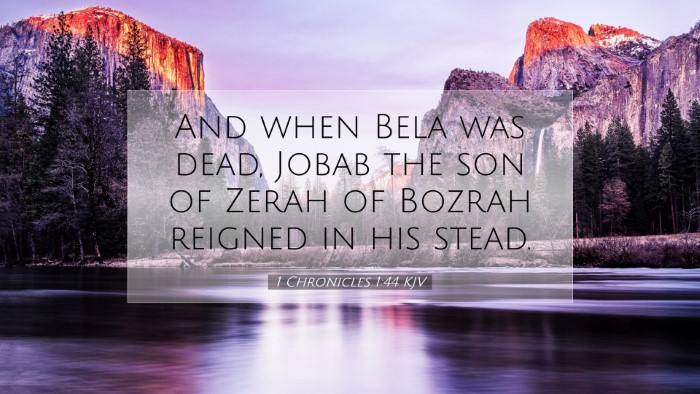Bible Commentary on 1 Chronicles 1:44
Bible Verse: 1 Chronicles 1:44 - "And the sons of Jephunneh; Kenaz: and the sons of Kenaz; Othniel, and Saraiah."
Introduction
This passage from Chronicles highlights the genealogy of the tribe of Judah, with a focus on the descendants of Jephunneh and his son Kenaz. Genealogies serve to connect the present with the past, showing God's faithfulness to His covenant people throughout generations. Understanding these names in their historical and theological context enriches our grasp of the unfolding narrative of God's plan.
Contextual Analysis
The books of Chronicles were written for the returned exiles in post-exilic Israel, aiming to remind them of their heritage, identity, and the covenant faithfulness of God. This genealogical listing serves to reaffirm the legitimacy of the returning community and establish their rightful place in God's redemptive history.
Jephunneh and His Lineage
Jephunneh, identified as a Kenezite, represents the inclusion of non-Israelites within the Israelite community, depicting God's grace extending beyond ethnic boundaries. The genealogy establishes Kenaz as a significant figure; his children, including Othniel and Saraiah, play crucial roles in later biblical narratives.
The Name Kenaz
The name "Kenaz" is associated with "hunter" in some interpretations, suggesting a warrior lineage. It denotes attributes of strength and courage, qualities necessary for leadership and conquest in the Promised Land.
Insights from Commentaries
Matthew Henry's Commentary
Matthew Henry emphasizes the importance of genealogies, stating that they are not mere lists of names but vital components of biblical history revealing God's providence. He notes that the mention of Jephunneh and Kenaz foreshadows the later conquests under Othniel, who would become the first judge of Israel.
Albert Barnes' Notes on the Bible
Albert Barnes points out that the significance of Kenaz and his descendants lies in their relationship with Caleb, the son of Jephunneh, who inherited a part of the Promised Land. He underscores that Othniel’s selection as a military leader by God was a pivotal moment in Israel's history, as he triumphed over adversaries and established judicial order.
Adam Clarke's Commentary
Adam Clarke provides an insight into the significance of Othniel, noting that he represents a bridge between the tribal leaders and the judges of Israel. Clarke discusses the implications of "the sons of Kenaz," linking them to broader narratives of warfare and deliverance in Israel’s early history. He highlights their role as symbols of divine empowerment and leadership in Israel.
Theological Implications
This genealogy illustrates the theme of God's choosing and calling of leaders from unexpected backgrounds. It reminds pastors and theologians that God’s sovereign plan encompasses individuals from various lineages, further advocating for inclusivity within the faith community. The legacy of these names transcends their historical contexts, reminding us of the continuity of faith and promise through generations.
Leadership and Legacy
The figures mentioned in 1 Chronicles 1:44 inspire reflections on the qualities of effective leaders. Othniel's portrayal as a courageous warrior who would lead Israel in times of crisis serves as a model for contemporary leaders within the church and society. Pastors and theologians can glean lessons on leadership, faithfulness, and the importance of lineage in understanding one's role in God's plan.
Applications for the Church Today
-
Encouragement in Genealogies: Modern believers may find significance in genealogies, recognizing the value of spiritual heritage that shapes identity and mission.
-
Inclusive Community: Just as God included Kenaz, from outside Israel, into His plan, the church today is called to embrace diversity and recognize the gifts and contributions of all members.
-
Leadership Development: The qualities of Othniel can serve as a basis for developing leadership programs within churches, focusing on courage, service, and reliance on God's guidance.
Conclusion
1 Chronicles 1:44, though brief, encapsulates significant theological and historical insight revealing God's faithfulness through the lineage of Jephunneh. By examining the lives of Kenaz, Othniel, and their descendants, we gain a deeper understanding of God's sovereign plan for His people. This passage, supported by the wisdom of public domain commentaries, provides rich material for scholars, students, and pastors seeking to understand the overarching narrative of Scripture and its application in our modern context.


